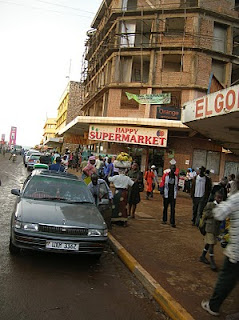This year my desire is to figure out what sustainable, long-term, practical things are being done to end poverty, especially in the area of agriculture and economics. At times its discouraging because there are a lot of failed attempts. But there are bright rays of hope too. Heres one of them Im witnessing firsthand...
So all of us know at least SOMEthing about Starbucks. Even non-coffee drinkers recognize that they have a cool logo. And those who work there part-time in college (or after) know that they offer great employee benefits.
Well Ive got to make another shout out to Starbucks, and its for their
CAFE Practices certification program.
In my opinion, this appraoch (social business) is one great way to fight poverty.
First of all, its a fact that of the
billions of dollars spent by the US government and NGOs (including well-meaning Christian ones) to fight poverty fail to make much of a difference (according to Paul Collier, University of Oxford; Hillary Clinton, US Secretary of State to name a few). This is due to a number of factors including politics, inefficiency and corruption.
Its also a fact that businesses have both influence and power. Thats where Starbucks comes in. They've created a certification for coffee farmers called CAFE Practices which provides producers with a premium price for their coffee in exchange for adherance to specific quality, social, and environmental guidelines.
So youre probably thinking, well thats just Fairtrade, but Starbucks has taken the whole thing a step further. (Not to get into too many details, but Fairtrade doesnt actually help small farmers a whole lot, at least not in Nicaragua).
Starbucks, as part of their business initiative, not only offers certification and technical advice, but small loans to farmers as well. This allows farmers to purchase better equipment, often with their neighbors, to make their farms more efficient and improve the quality of their coffee to reach Starbucks expectations. Starbucks has experienced a Gramean-bank-like 99% repayment rate (extremely rare, by the way). Why?
Starbucks, as a business has the power to create pressure, a factor that is gaining influence in this globalized world. They have a vested interest in the sucess of the farmers it has loaned money too. The farmers have an incentive to repay the loans, recognizing that a continued relationship with Starbucks ensures them technical advice and higher coffee prices. Its mutually beneficial.
Besides finances, CAFE Pratices is doing a great deal to lift people out of poverty. Poverty is very much a psycological problem. Most rural poor in Nicaragua, instead of taking the initiative to better their own lives, have become reliant on handouts. They often feel like they have no value, no voice, and no future, which further encourages them to do nothing. Starbucks has changed that attitude in many ways. Farmers under CAFE Practices recognize that they too can take part in the global economy. They have something that the world wants, they have power, they can make changes that will affect their own future. Starbucks is the link thats making it happen.
PAC actually has a model very similar to Starbucks, with 120 of their small coffee farmers currently in the first (of 3) years needed to obtain CAFE Practices certification, with hope to increase the number of certified farmers each year.
While CAFE Practices isnt perfect, it's still an impressive effort thats making a difference. It makes me glad to see that not every aspect of large corporations are bad, at least not in the mind of small Nicaraguan coffee producers.






















 So aparently we were the only fans of the beach - not going to complain
So aparently we were the only fans of the beach - not going to complain Fisherman bringing in the boats
Fisherman bringing in the boats

 The boats
The boats








 Check out the view from the top, Granada is in the background
Check out the view from the top, Granada is in the background

